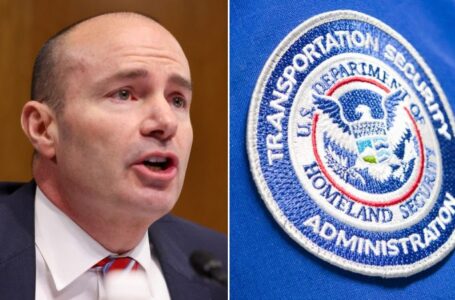‘Nothing will be easy about returning:’ Survivors mark 80th anniversary of Auschwitz liberation
The fight for the House and Senate: Where things stand


Congress may be headed for an Election Day double flip.
With less than four weeks to go, Republicans appear poised to win the Senate, which is currently controlled by the Democrats. The Democrats, meanwhile, seem to have a slight edge in the race for the Republican-controlled House.
If the polls and predictions prove right — and that is still a big if — it would be the first such flip, a historic and fitting outcome for a political era marked by slim margins and deep division.
A scenario where voters flip the majorities in both the House and Senate, but in opposite partisan directions, could lead to gridlock as a new president attempts to govern next year. Congress faces crucial deadlines to fund the government and avoid defaulting on federal debt in coming weeks. Narrow, divided majorities in Congress could make meeting them far more difficult.
In the final weeks, both parties are trying hard to break through to undecided and independent voters. In many swing districts and states, that means moderating messaging on key issues like abortion and immigration, and trying to paint opponents as extreme.
Republicans looking strong in Senate races
Republicans face a remarkably favorable map as they battle to flip the Senate. Democrats are defending 23 seats, many of them in red and purple states, while Republicans are running in 11 states, all of them on their turf.
Sen. Joe Manchin III, an independent who caucuses with Democrats, decided to retire this year, giving Republicans one all-but-certain flip in the ruby-red state of West Virginia. That would lead to a 50-50 split Senate if all other seats stayed the same, with the party in control of the White House deciding the balance in the Senate.
But Republicans — whose leader, Sen. Mitch McConnell (R-Ky.), is stepping down — are pushing for more wins to decisively flip the chamber red no matter who is president.
The red state of Montana, where Sen. Jon Tester (D) is seeking a fourth term, could mark another pickup for Republicans. Tim Sheehy, a businessman and ex-Navy Seal, has led Tester in some recent polls, as GOP and Democratic groups continue to pour tens of millions of dollars into advertising in the state of just over 1 million people.
As Montana trends red, the Senate Democrats’ campaign arm announced late last month it was making a multimillion-dollar investment in advertising in Florida and Texas, both Republican-leaning states with GOP incumbents up for reelection in November.
Sen. Ted Cruz (R-Tex.), who survived a closer-than-expected challenge from Democrat Beto O’Rourke in 2018, has faltered in some polls against Democratic Rep. Colin Allred, a former football player. And Sen. Rick Scott (R-Fla.) holds a narrow lead over former Democratic Rep. Debbie Mucarsel-Powell. The Cook Political Report recently switched Cruz’s race from “Likely Republican” to “Lean Republican,” a reflection of the tightening polls there. Scott is still considered likely to win in Florida in that ranking.
The Senate Republicans’ campaign arm and GOP super PACs have poured millions of dollars into defending two of its incumbents in red states — Cruz and Sen. Deb Fischer of Nebraska, who faces a surprisingly tough challenge from an independent candidate.
Democrats also face tough Senate races in red and purple Ohio, Michigan, Arizona, Pennsylvania and Wisconsin. So far, however, most polls have shown them leading their challengers, in part because voters appear willing to split their tickets between Donald Trump and a Democratic Senate candidate.
Republicans have blamed a lack of money to buy advertising compared with Democrats and the fact that their candidates are less well known than their competitors for why they are trailing Trump in polls so far. The Democrats’ Senate candidates have, for the most part, significantly outraised their GOP challengers, allowing them to buy more advertising.
If Republicans flip the chamber and hold a narrow majority, governing will probably be challenging for whomever succeeds McConnell. So far, Sens. John Thune (R-S.D.), John Cornyn (R-Tex.) and Scott have announced they are running for the spot, with no clear front-runner emerging yet.
A fierce battle for the House
House Republicans, meanwhile, are working to protect their razor-thin majority and hope to expand it to avoid the divisive battles that have played out under their watch.
Republicans are defending 15 seats considered tossups, 12 of which are in districts that favored President Joe Biden four years ago, according to the Cook Political Report with Amy Walter.
House Democrats must keep all 214 seats they currently hold and flip only four held by Republicans to win back the majority they lost in 2022. Democrats are defending 11 tossups, with just five districts that favored Trump.
The pathway to the majority runs through districts sprinkled across the country and in the traditional battleground states — Pennsylvania, Arizona, Wisconsin and Michigan — and, surprisingly, in the reliably liberal states of California and New York, where most of the 16 Republicans representing districts Biden won in 2020 reside.
Republicans are expected to gain three seats in North Carolina following redistricting disputes, while Democrats will gain two seats in Louisiana and Alabama after the Supreme Court ruled both states drew district lines to dilute votes from majority-Black parts of the state.
Several signs are pointing to Democrats regaining the majority. Just last week, Cook shifted five House race ratings in favor of Democrats, including four Midwestern seats that once seemed ripe for Republican victories. Multiple House Democratic and Republican lawmakers, strategists and campaign aides point to Vice President Kamala Harris’s late entrance into the race as a key factor that has boosted enthusiasm among Democratic voters, including in liberal-leaning cities in GOP states, inspiring thousands to donate and volunteer to House Democratic races.
“I do think that the energy, the enthusiasm, but also our authentic, very independent-minded candidates who are running in all corners of the country really resonate with people,” said Rep. Suzan DelBene (D-Wash.), who chairs the House Democratic campaign arm, the Democratic Congressional Campaign Committee. “We are pulling ahead of our Republican opponents because voters can see and feel the difference.”
Rep. Richard Hudson (R-N.C.), who chairs the House GOP campaign arm, the National Republican Congressional Committee, acknowledged seeing Democrats coming home earlier than usual this cycle, but said the GOP campaign arm’s internal polling has not shown Harris’s enthusiasm effect influence a significant change in competitive districts. The NRCC maintains that its most vulnerable candidates continue to run ahead of Trump this cycle, a trend that continues from 2020, when Republicans gained seats in the House despite Trump losing the White House.
“Every one of these races is tight, it’s a small battlefield. Every one is close, but I feel good about where we are,” he said. “We’ve demonstrated what we’re for and what we’ll do if you give us the White House and the Senate.”
House Republicans are also beginning to fret after seeing another fundraising cycle where the DCCC has consistently outraised and outspent the NRCC each quarter in a similar manner that made GOP candidates unable to remain competitive in some swing districts last cycle. While the NRCC has raised more this cycle than in 2022, the latest August filing showed that the DCCC brought in $22.3 million to the NRCC’s $9.7 million.











